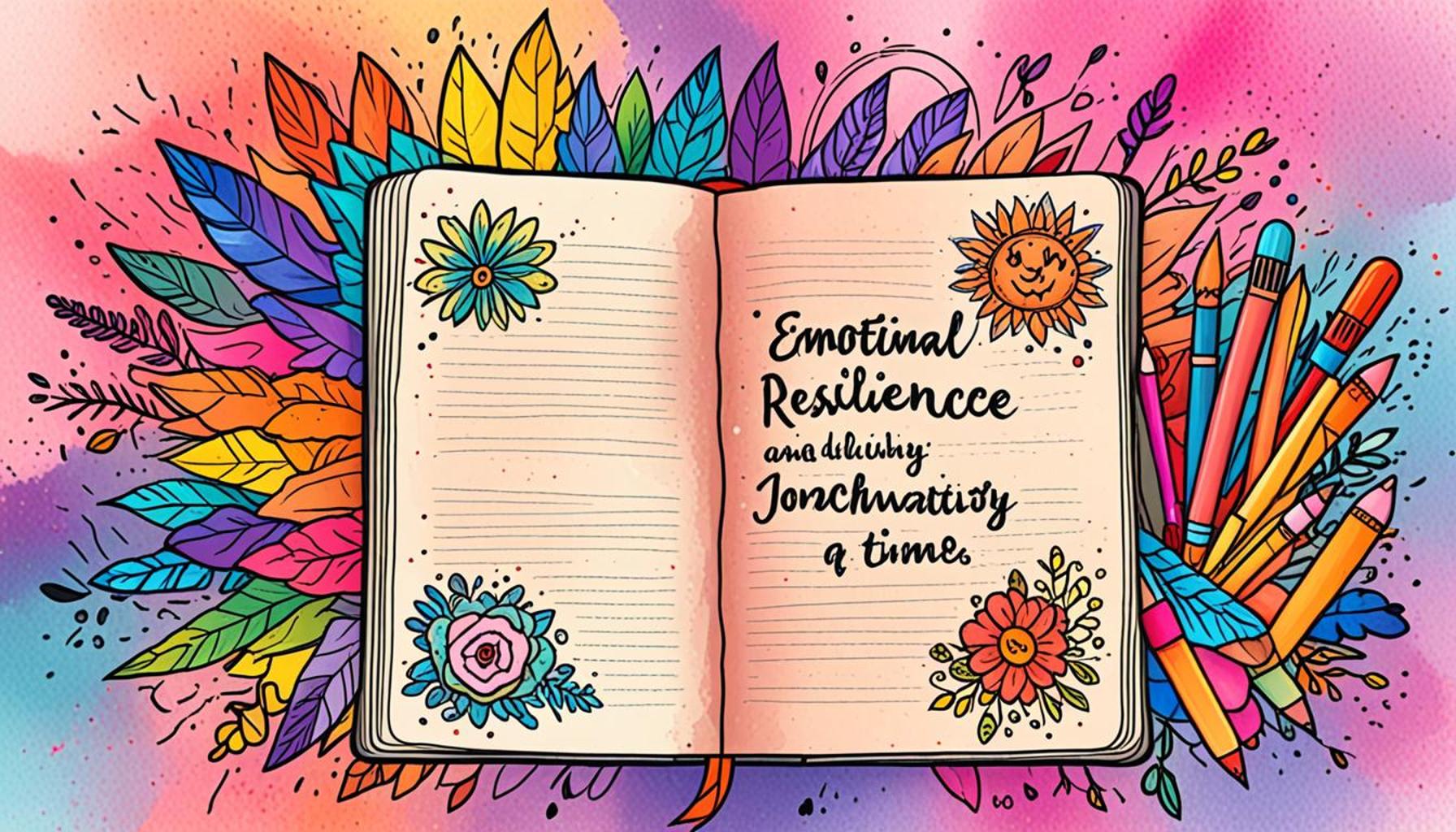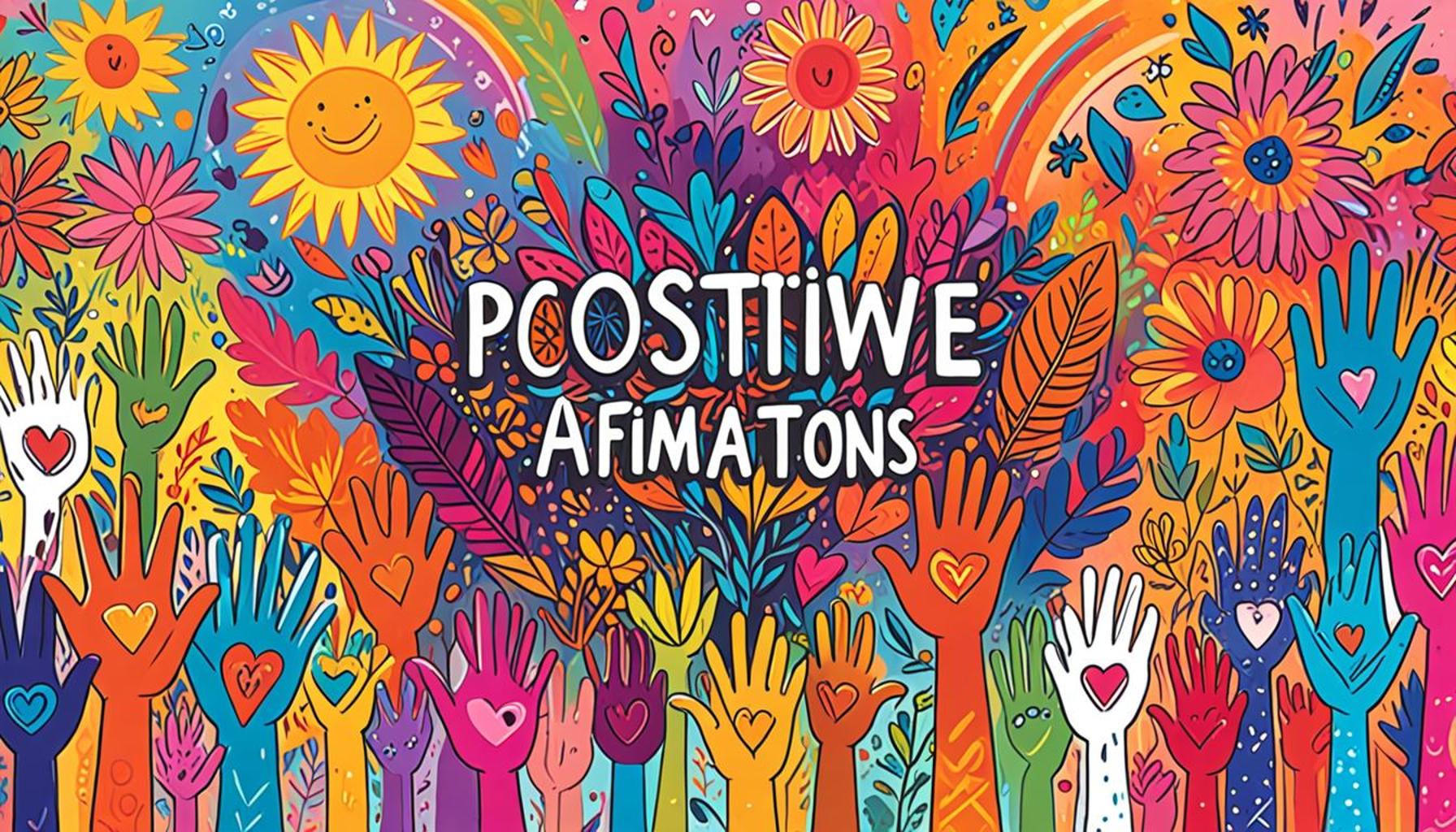Emotional Resilience and Affirmations: Creating a Positivity Journal to Face Difficult Times

Building Strength in Adversity
In today’s world, riddled with challenges and uncertainties, emotional resilience has become crucial for navigating the tumultuous landscape of life. Cultivating mental fortitude empowers individuals to confront obstacles head-on and emerge with renewed strength. One effective approach to enhancing this resilience is through the practice of affirmations and positivity journaling, tools that invite reflection, gratitude, and self-empowerment.
The Power of Affirmations
Affirmations are more than mere feel-good statements; they are potent declarations that can profoundly alter how we view ourselves and our circumstances. Utilizing affirmations can lead to significant benefits, including:
- Shifting Mindsets: Affirmations allow one to transform pervasive negative thoughts into constructive, positive ones. For instance, replacing “I cannot do this” with “I am capable of overcoming challenges” can shift one’s mindset from a place of defeat to empowerment.
- Building Confidence: Regularly repeating affirmations reinforces a sense of self-worth. Statements like, “I am enough” create a foundation of confidence, vital for tackling life’s inherent difficulties.
- Encouraging Growth: Affirmations can foster a mindset geared towards continuous improvement. Phrases such as “Each day, I am becoming a better version of myself” inspire ongoing personal development, promoting resilience through adaptability.
Creating a Positivity Journal
A positivity journal serves as a tangible tool for those aiming to bolster their emotional health. This journal can take various forms and include diverse elements, such as:
- Daily Affirmations: A section dedicated to positive statements can inspire self-belief and serve as daily motivation. For example, writing “Today, I choose happiness” can set the tone for a positive day.
- Gratitude Lists: Acknowledging the things we appreciate fosters a positive outlook. In Nigeria, where many face significant societal and economic pressures, noting small joys—like the warmth of community support or the beauty of a sunset—can provide emotional solace and perspective.
- Reflections: Recording insights gained from daily experiences cultivates a deeper understanding of one’s feelings and responses to challenges. Reflective entries can help individuals recognize patterns that hinder or support their growth.
In Nigeria, these tools resonate especially strongly due to persistent societal challenges, making the cultivation of emotional resilience even more relevant. By integrating affirmations and positivity journaling into daily routines, individuals can forge stronger mental pathways and develop coping strategies for life’s inevitable trials. Embracing these practices not only enhances personal resilience but also fosters a more supportive community culture, where individuals uplift one another through shared experiences and affirmations. Harnessing the power of words—both spoken and written—can truly enable people to transform adversity into strength, demonstrating that even in the face of hardship, hope and resilience can thrive.
YOU MAY ALSO LIKE: Read read another article
Harnessing the Benefits of Positive Thinking
The journey to emotional resilience often begins with self-awareness and positive thinking. In Nigeria, where individuals frequently navigate social and economic challenges, cultivating a positive mindset can serve as a lifeline. The daily practice of positive affirmations and maintaining a positivity journal offers individuals the tools they need to confront these challenges effectively.
The Role of Positive Affirmations in Daily Life
Positive affirmations are more than just uplifting words; they are strategic self-empowerment tools that can shift perspectives. By consciously choosing to speak positively about ourselves, we can dismantle the chains of negativity that often hold us back. The practice can lead to several key outcomes:
- Enhancement of Emotional Resilience: Engaging with affirmations regularly strengthens emotional resilience, helping individuals better handle stressors. For instance, when faced with hardships such as job loss or familial strife, statements like “I will overcome this challenge” can instill a sense of hope and motivation.
- Promotion of Mental Well-being: Positive affirmations have been shown to alleviate symptoms of anxiety and depression. By reiterating phrases like “I deserve happiness and success,” individuals can create a mental barrier against pervasive negative thoughts.
- Fostering Community Connection: Sharing affirmations in social settings can unify individuals, creating a collective atmosphere of support. In Nigeria, where communal ties are strong, group affirmations can strengthen bonds by reinforcing shared beliefs in resilience and positivity.
Starting Your Positivity Journal
Creating a positivity journal is an effective way to track progress and reinforce the power of affirmations. This journal doesn’t have to be elaborate; a simple notebook or even a digital format can suffice. Here are some pivotal elements to include:
- Section for Daily Affirmations: Dedicate the first page or section of your journal to write daily affirmations. Setting a consistent routine, such as writing them each morning, can serve to brighten your outlook for the day ahead.
- Gratitude Entries: At the end of each day, reflect on three things you are grateful for. This simple exercise can reshape your perspective and instill a sense of appreciation, even amidst turmoil. Small victories, like enjoying a shared meal with friends or receiving a kind word from a neighbor, can significantly enhance emotional states.
- Personal Reflection: Allocate time to journal about your day, expressing your thoughts and feelings. This reflective practice enables individuals to identify emotional triggers and understand their coping mechanisms, which is vital for personal growth.
In a culturally rich environment like Nigeria, where the influence of community and relationships plays a significant role, positivity journals can act as a bridge to foster solidarity amongst people facing similar challenges. Through our shared experiences and collective affirmations, we can create a nurturing space that empowers each other to turn difficulties into stepping stones toward resilience.
| Advantages | Descriptions |
|---|---|
| Increased Self-Awareness | Positivity journals encourage individuals to reflect on their feelings and thoughts, leading to greater understanding and acceptance of oneself. |
| Emotional Regulation | By regularly writing affirmations and positive experiences, users develop enhanced emotional regulation skills, helping them manage stress better during challenging situations. |
The importance of maintaining a positivity journal cannot be overstated, especially in terms of mental health and personal growth. One significant advantage is the promotion of increased self-awareness. Engaging with your thoughts and feelings on paper allows you to process and understand them. This reflective practice creates a sense of clarity and acceptance, enabling individuals to embrace their complexities. Moreover, emotional regulation serves as another pivotal benefit of journaling. By consciously writing down affirmations and positive experiences, individuals cultivate their ability to recognize and adapt their emotional responses. This heightened awareness equips them to face trials with a resilient spirit, transforming what could be overwhelming circumstances into manageable experiences. With these tools at hand, individuals can effectively harness the power of their minds to navigate through difficult times, leading to a more fulfilling and balanced life. Journaling not only serves as an outlet but also as an instrument of personal transformation and empowerment. As readers delve deeper into this topic, they will discover even more benefits and practical tips for creating their own positivity journal.
RECOMMENDED: Check out this similar article
Building a Personalized Affirmation Practice
To maximize the benefits of a positivity journal, it is essential to establish a personalized affirmation practice tailored to individual experiences and circumstances. In a diverse country like Nigeria, where cultural influences vary considerably, embracing personal themes while integrating universal statements of resilience can create powerful affirmations. Here are some strategies to enhance your affirmation practice:
Crafting Meaningful Affirmations
Creating affirmations that resonate deeply with personal experiences can significantly boost their efficacy. Individuals should reflect on challenges they face and the qualities they wish to nurture. For example, a student grappling with academic pressure might affirm, “I am capable of achieving my goals.” Meanwhile, someone facing career uncertainties might state, “I embrace change and see opportunities in every challenge.” These tailored affirmations should embody the essence of the individual’s goals and struggles, making them more impactful.
Incorporating Local Wisdom and Proverbs
Integrating local proverbs or sayings can enrich the affirmation experience. Nigerian culture is filled with rich wisdom passed down through generations. For example, the Yoruba saying, “Ibi ti a ti n wo ni a ti n ko si,” meaning “we learn from the experiences of others,” can be paired with affirmations about learning and growth. Adapting traditional wisdom into affirmations not only enhances connection with one’s heritage but also reinforces shared community values, making the process more relatable.
The Power of Visualization
Affirmation practices can become more effective when coupled with visualization techniques. Individuals can dedicate a few moments each day to vividly imagine their affirmations coming to life. For example, someone affirming they will achieve their dream job may visualize themselves working confidently in that role, interacting positively with colleagues, and contributing meaningfully to their community. Visualization solidifies the belief in these affirmations, helping individuals embody the resilience required to make them a reality.
Tracking Progress and Setbacks
Another vital aspect of a positivity journal is tracking both progress and setbacks, as emotional resilience is not a linear journey. Taking note of challenges faced, emotional responses, and patterns observed can provide insight into personal growth. When individuals reflect on entries during tough times, contrasting them with moments of resilience can illuminate paths to recovery. For instance, if a person previously noted feelings of despair but later wrote about overcoming those emotions through community support or self-care, it can strengthen their belief in resilience.
Sharing the Journey
Lastly, sharing affirmations and positivity journal entries with trusted friends or family can amplify their impact. In Nigeria, where the communal spirit prevails, engaging discussion about personal growth can be beneficial. Encouraging friends to join in positivity journaling or sharing experiences can create a support network, making it easier to navigate life’s challenges together. By uplifting one another, not only do individuals reinforce their affirmations but also strengthen community bonds, cultivating a collective resilience that thrives in adversity.
RECOMMENDED: Check out this similar article
Conclusion
In navigating the turbulent waters of life, emotional resilience serves as a beacon of strength, guiding individuals through unforeseen challenges. A positivity journal, enriched with personalized affirmations, is a powerful tool that not only fosters self-awareness but also builds a bridge towards healing and growth. As demonstrated, crafting affirmations that resonate with personal struggles and integrating local wisdom enriches the journaling experience, empowering individuals to connect deeply with their cultural heritage while embracing universal themes of resilience.
The act of journaling is reflective, allowing individuals to confront their fears, celebrate achievements, and recognize that resilience is often born from vulnerability. Coupled with visualization techniques, one’s affirmations can transform dreams into tangible realities, and tracking progress provides a clear map of personal evolution amidst adversity. Furthermore, sharing this journey with a supportive community amplifies the impact of affirmations, emphasizing the collective strength found in unity. In Nigeria, where the spirit of community is paramount, engaging others in this affirming practice can cultivate a robust support network vital for facing life’s uncertainties.
Ultimately, creating a positivity journal is not merely an act of self-care; it is a commitment to personal development and growth. As individuals reflect on their entries, they cultivate a profound understanding of their emotional landscape, reminding them that resilience can flourish even in the most challenging times. Embrace the power of affirmations and let your positivity journal be the stepping stone towards a more fulfilling and resilient life.


